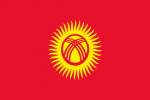Kyrgyzstan: Politician's Arrest Sparks Protests, Threatens Unrest
Rédigé par admin - - aucun commentaire
Hundreds of people turned out in the capital, Bishkek, on February 26 in rowdy protest at the overnight arrest of Ata-Meken party leader Omurbek Tekebayev on fraud and corruption charges. Tekebayev has denied the accusations, which his allies have described as politically motivated. A large crowd concentrated around the headquarters of the State Committee for National Security, or GKNB, where Tekebayev was taken after disembarking from an international flight in the early hours of the morning. While there was much shoving between protesters and police, and the crowd reportedly tried to barge its way into the building on two occasions, no violence appears to have ensued. Tekebayev supporters holding a megaphone delivered speeches and were at one stage joined by Roza Otunbayeva, who served as interim president following the April 2010 revolution that culminated in the current president, Almazbek Atambayev, coming to power.
Otunbayeva spoke in defense of Tekebayev, arguing that he had made important contributions to the country’s wellbeing.
“He is a person who always fought for the truth,” she was quoted as saying by Kloop.kg news website.
Tekebayev was a central figure in the anti-government protest movement that led to the 2010 revolution and later played an important part in drafting a revised constitution that on paper was intended to water down the powers of the presidency and usher in a parliamentary system.
Attendance at the protest outside the GKNB gradually dwindled as evening approached.
Zanoza.kg reported that there was also a rally of around 130 people in the southern town of Bazar-Korgon, where Tekebayev’s Ata-Meken party has historically enjoyed the bulk of its support.
The head of the Bazar-Korgon district, Aibek Berimkulov, said that a resolution was drafted at the meeting calling for Tekebayev’s release. Berimkulov said that he urged demonstrators to refrain from causing trouble by, for example, blocking the road linking the south of the country to the north.
“They have promised not to do it. Some of them have gone up to Bishkek,” he was quoted as saying.
The Ata-Meken party has said that investigators are keeping Tekebayev in custody for 48 hours and that the General Prosecutor’s Office will after that file a court plea for the detention to be extended pending investigations.
The case against Tekebayev concerns his activities in 2010, when he served as deputy prime minister in the interim government. Investigators have accused the politician of securing $1 million in illegal payments in exchange for granting a Russian businessman preferential access to the sale of a part-nationalized mobile phone service provider.
Despite apparently having lost $1 million as a result of the claimed corruption, the businessman in question, Leonid Mayevsky, who lives in Russia, has never until now made any public statement about the alleged wrongdoing since it purportedly took place.
A number of Ata-Meken deputies have been targeted with criminal investigations in the past few months.
On December 26, prosecutors opened a criminal probe against Aida Salyanova on suspicion of abusing her office when she was General Prosecutor — a position she occupied from April 2011 to January 2015. Last week, it was the turn of Almanbet Shykmamatov, a former justice minister, who is facing corruption charges. Shykmamatov was summoned to the GKNB for an interrogation on February 24 and was released only after almost 10 hours of questioning. The crowd of supporters that had mustered outside the building as the interrogation was taking place cheered as the deputy emerged.
Tekebayev, Salyanova and Shykmamatov drew particularly strong ire from President Atambayev through their concerted resistance to a constitutional referendum held in December. Critics contended at the time that the amendments would make it easier for Atambayev and his entourage to retain power even after the president ended his single constitutionally permitted term in office later this year.
In the run-up to and aftermath of that vote, Tekebayev lobbed numerous accusations in Atambayev’s direction, accusing him of being a corrupt leader and threatened to bring impeachment proceedings against him.
In reality, however, Tekebayev has enjoyed dwindling political support over the years, so the robustness of Atamabayev’s reaction to such broadsides appear bizarrely disproportionate. While arresting Tekebayev may physically marginalize him for the time being, this course of action could well lead to a revival in the potentially destructive type of extra-parliamentary politics that has driven Kyrgyzstan to the edge of collapse before.
Copyright © eurasianet
